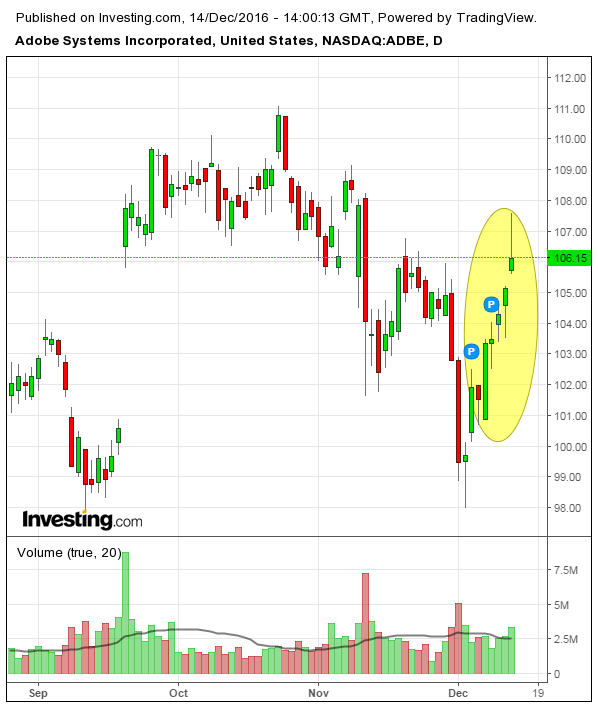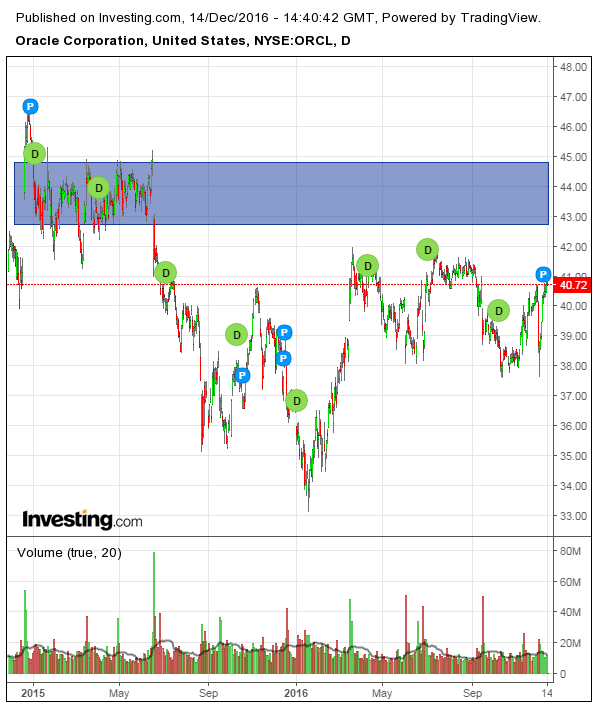by Eli Wright
Two major tech companies, Adobe (NASDAQ:ADBE) and Oracle (NYSE:ORCL) report earnings later today, after the market close.
Adobe
Software giant Adobe is set to report Q4 2016 earnings this afternoon, with expected EPS of $0.86 on $1.57B in revenue. Since Q3 2014, the company's earnings growth has consistently met—and even exceeded expectations. So, just how long can Adobe sustain such this type of growth?
Adobe has embraced cloud computing, and approximately 80% of the company's revenues are now generated by their Creative Cloud, Adobe Marketing Cloud, and Document Cloud subscription services. The remaining 20% of revenue derives from product, services and support, which includes consulting, training and maintenance. During Q3, revenues from cloud services subscriptions increased 40% YoY. However the product, services, and support segments experienced an 18% decline.
In the third quarter of this year, Adobe reported 20% YoY revenue growth and EPS of 0.62.
With the company's consistently good track record for innovation, coupled with additional signs of growth from their subscription/licensing programs, another good quarter is definitely achievable. Based on expectations for today's report, EPS of $0.86 would represent a growth rate of 20% from the previous quarter, as well as 40% growth YoY.

The average analyst consensus for Adobe's 12-month price target is $120.92. As of yesterday's close, shares were just a hair above the low-end of the consensus, estimated at $105. Momentum has been bullish over the past several days, and with room for additional upward movement in Adobe's technicals, it‘s reasonable to anticipate the stock rising above its current all-time high of $110. However, for a company that doesn’t pay dividends and has a P/E ratio over 50, higher than the industry average, we believe Adobe is overvalued at this point. It would be better to wait for a dip,
Oracle
Another software and cloud computing systems behemoth, Oracle, is also scheduled to report earnings after the market close. Expectations for ORCL's Q2 2017 call for EPS of $0.60 on $9.06 billion in revenue.
Oracle has missed earnings targets in four of the past five quarters and come in short on revenue targets during three of the past five quarters as well. Still, shares are up almost 13% YTD...though that doesn’t mean the stock is a great investment right now.
Oracle’s bread and butter is software services. Last quarter, 68% of the company's revenue was generated by this segment. Unfortunately, sales in this segment continue to decline (down approximately 0.5% YoY). Hardware products and services, which provide 21% of overall revenue have also taken a hit, down 18% YoY.
The company's best hope for growth comes from Oracle's position within the cloud computing segment, which continues to improve. Last quarter cloud computing accounted for 11% of overall revenue, up 59% YoY. Still, this could be a long-shot; competitors in this arena include Amazon (NASDAQ:AMZN), Alphabet (NASDAQ:GOOGL), Microsoft (NASDAQ:MSFT), IBM (NYSE:IBM) and Salesforce (NYSE:CRM)—each of which has been building market share for quite some time now.

The 12-month consensus price target for Oracle is $44.13, smack in the middle of its last big range of consolidation, with estimates for the low end forecasting $31. Yesterday the stock closed $40.88, relatively close to consensus targets.
With Oracle still dependent on declining software and hardware revenues, it's too early to know if their efforts to transition their core business away from this segment will be successful. Oracle's future clearly depends on how well and how quickly it can ramp up its cloud computing segment, as well as how effectively it can compete with the above-mentioned cloud computing leaders, many of whom are industry behemoths.
In early November, Oracle completed a $9.3 billion acquisition of NetSuite, a cloud computing company that provides services for managing business financials, operations and customer relations. The jury is still out on whether the deal will pay off by helping shift Oracle away from its software and hardware core. Right now we believe Oracle is worth watching, but not buying.
